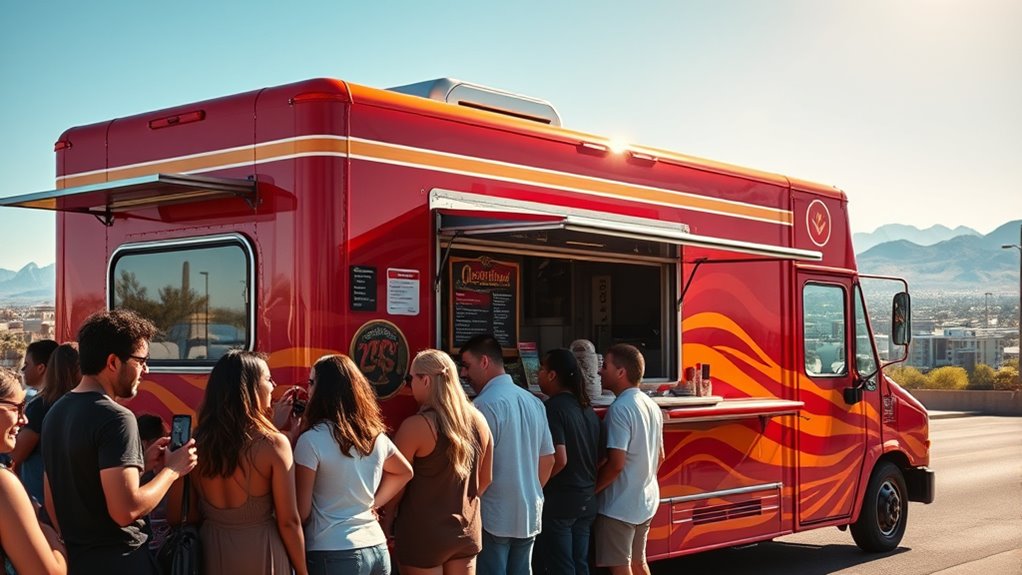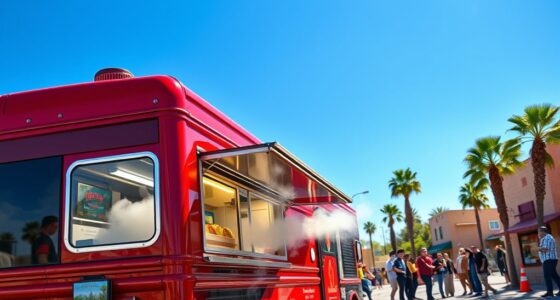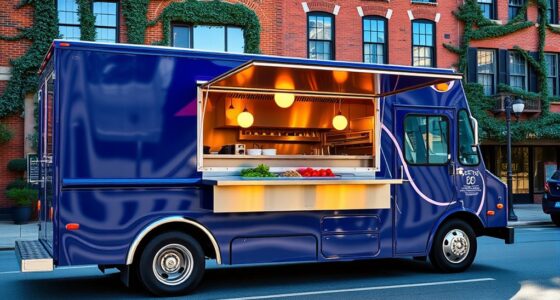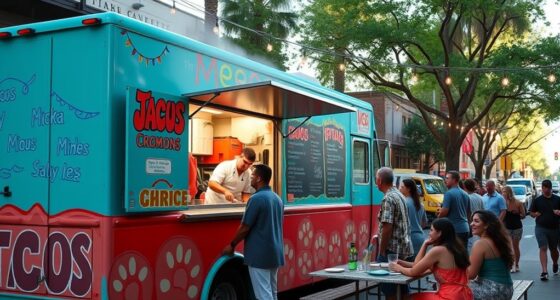To start a food truck in Phoenix, AZ, you need to complete online permit applications and guarantee compliance with local health and zoning regulations. Budget for equipment, branding, and permits, and explore financing options like SBA loans to cover costs. Build a strong brand, use social media for marketing, and participate in local festivals and markets to grow your customer base. If you’d like to explore detailed steps, keep going for more tips and insights.
Key Takeaways
- Complete online permit applications and ensure compliance with Phoenix health and zoning regulations for food trucks.
- Secure funding through SBA loans, budget for equipment, branding, and insurance to finance startup costs.
- Select and install space-efficient, compliant kitchen equipment and sanitation stations meeting local codes.
- Develop strong branding and utilize social media for marketing, community engagement, and event participation.
- Implement customer loyalty programs and leverage local events to build brand recognition and foster community relationships.
Starting a Food Truck Journey

Starting a food truck journey can be an exciting and rewarding venture, but it requires careful planning and preparation. Your first step is establishing strong food truck branding that captures your unique identity and appeals to your target audience. Consistent branding across your truck’s design, menu, and promotional materials helps build recognition. Additionally, social media outreach is essential for attracting customers and creating buzz. Use platforms like Instagram and Facebook to showcase your menu, share location updates, and engage with followers. Building an online presence early on helps drive foot traffic and fosters community loyalty. Combining eye-catching branding with active social media efforts sets a solid foundation for your food truck’s success in Phoenix’s competitive market.
Understanding Local Requirements
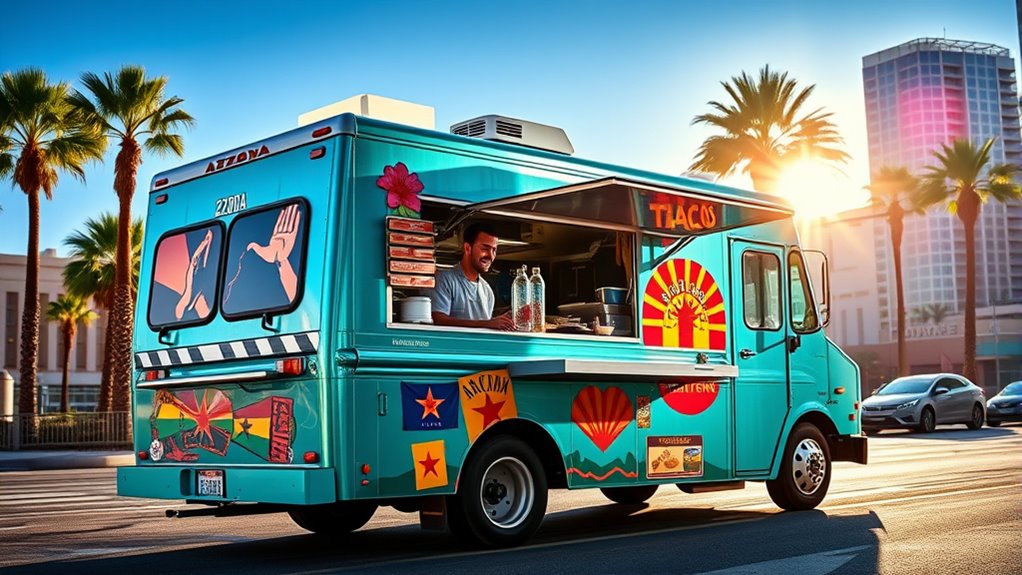
To get your food truck up and running in Phoenix, you need to navigate local requirements like online permit applications and sanitation station setup. You’ll also want to be aware of designated truck zones to avoid parking violations. Understanding these rules guarantees your business complies and operates smoothly from the start. Additionally, reviewing the Legal Information such as Terms and Conditions ensures your compliance with local regulations.
Online Permit Application Portals
Managing the online permit application portals is a crucial step in launching your food truck in Phoenix, AZ. These digital licensing platforms streamline the process, allowing you to submit your online permit applications quickly and efficiently. By using the city’s online permit portal, you can track your application status, upload necessary documents, and receive approvals without visiting multiple offices. Familiarize yourself with the specific requirements for food truck licensing in Phoenix, as each permit is part of the broader digital licensing system. Ensuring your online permit application is complete and accurate helps avoid delays. Taking advantage of these online portals saves time, reduces paperwork, and keeps you organized as you move forward with your food truck business.
Sanitation Station Setup Requirements
Understanding the local requirements for setting up a sanitation station is vital to guarantee your food truck complies with Phoenix health regulations. You must meet specific sanitation standards that ensure proper hygiene and safety. This includes installing a designated area for handwashing with hot and cold water, soap, and paper towels. Your cleaning procedures should follow strict protocols to prevent contamination, such as regular sanitizing of surfaces and utensils. The sanitation station needs to be easily accessible and clearly marked for staff and inspectors. Additionally, ensure your setup adheres to any local plumbing codes and waste disposal rules. By carefully following these requirements, you’ll maintain high sanitation standards and avoid violations that could delay your food truck’s operation.
Designated Truck Zones
Choosing the right location for your food truck involves knowing where you’re allowed to operate within Phoenix. Designated truck zones are specific areas where parking regulations permit food trucks to set up. These zones help ensure you stay compliant with city rules and avoid fines. Before parking, check for any restrictions related to vehicle maintenance, as some zones may have limits on idling or repairs. Understanding these requirements prevents legal issues and keeps your truck in good condition. Make sure to verify the designated zones regularly, as they can change based on city policies or special events. By parking in approved areas and following local regulations, you can focus on serving customers without worry. Staying informed about designated truck zones is essential for smooth operation in Phoenix.
Setting Up Your Base of Operations
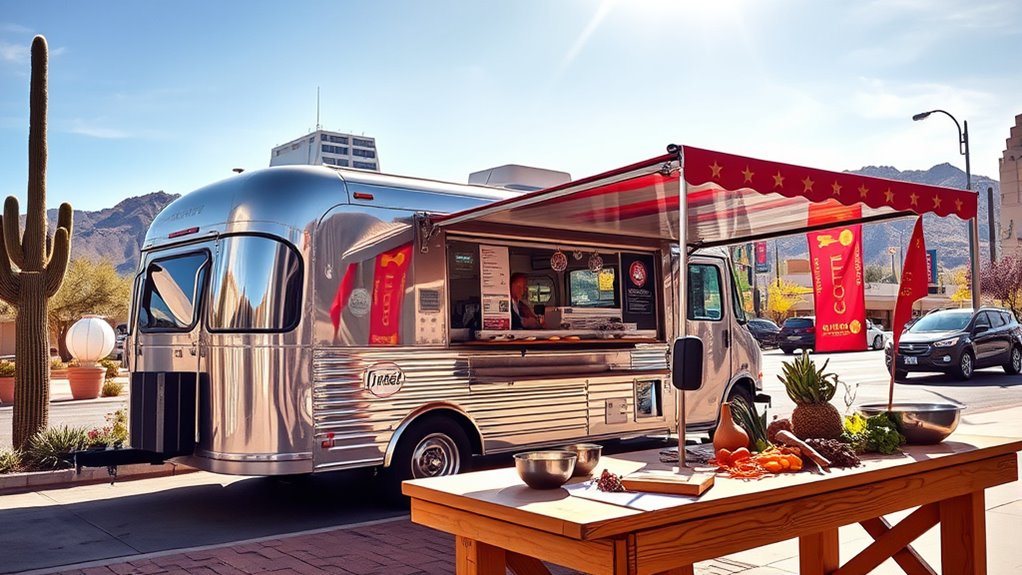
To establish your base of operations, you’ll need to take into account shared kitchen licensing requirements and choose the right custom kitchen equipment. Ensuring your space meets local health and safety standards is vital for smooth operations. Selecting the appropriate equipment will help you serve quality food efficiently and stay compliant. Familiarizing yourself with dog breeds can also inspire creative branding or menu items that appeal to pet lovers.
Shared Kitchen Licensing Requirements
Setting up your food truck in Phoenix often requires operating out of a shared kitchen that meets licensing requirements. These shared kitchens are approved facilities where multiple food vendors can prepare their products legally. To comply, you’ll need to ensure the kitchen has proper permits and health department approval. Local licensing standards mandate that the shared kitchen maintains strict sanitation, proper storage, and equipment standards. You’ll likely need to provide documentation proving your use of this space and pass health inspections. It’s essential to choose a shared kitchen that aligns with Phoenix’s specific licensing requirements. Doing so ensures your food truck remains compliant with city regulations, avoiding delays or fines as you get your business off the ground.
Custom Kitchen Equipment Selection
Selecting the right kitchen equipment is essential for creating an efficient and compliant food truck setup. Your custom kitchen design should maximize space while guaranteeing smooth workflow. Choose equipment that’s easy to clean and maintain to avoid downtime. Proper equipment maintenance is crucial for longevity and safety. Consider the table below to help select essential items:
| Equipment Type | Features to Consider | Maintenance Tips |
|---|---|---|
| Commercial Grill | Even heat, durable surface | Regular cleaning, check burners |
| Prep Tables | Stainless steel, adjustable height | Sanitize daily, inspect for rust |
| Refrigeration Units | Energy-efficient, compact design | Clean coils monthly, defrost as needed |
| Cooking Ventilation | Adequate airflow, noise level | Filter cleaning, periodic inspection |
This approach ensures your equipment supports your custom kitchen design and remains in top condition.
Budgeting and Financing Your Food Truck
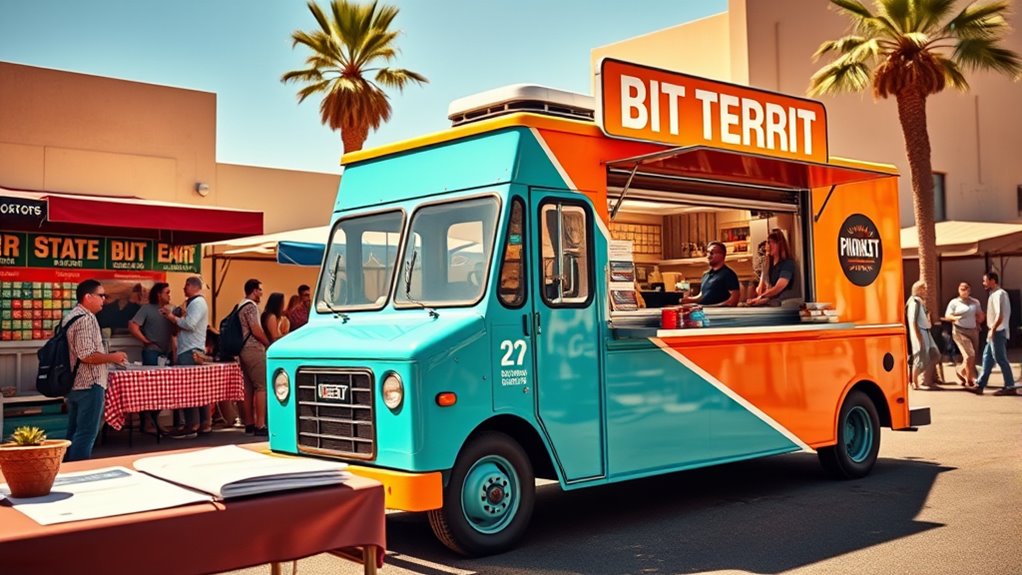
To start your food truck venture, you’ll need to consider your initial equipment costs and how you’ll finance them. Small Business Administration loans can provide vital funding, but don’t forget to budget for liability insurance to protect your business. Understanding these financial aspects helps guarantee you’re prepared for the road ahead.
Initial Equipment Investment Costs
Starting a food truck in Phoenix requires careful planning of your initial equipment investment costs, which can substantially impact your overall budget. You’ll need essential items like cooking equipment, refrigeration, and serving supplies. Don’t forget truck branding to attract customers and menu customization options to stand out. Here’s a breakdown of typical costs:
| Equipment | Estimated Cost | Notes |
|---|---|---|
| Cooking appliances | $10,000 – $20,000 | Includes stove, oven, fryer |
| Truck branding | $2,000 – $5,000 | Wraps and decals |
| Refrigeration | $3,000 – $7,000 | Freezers, coolers |
| Kitchen tools & supplies | $2,000 – $4,000 | Utensils, prep stations |
| Menu customization tools | $1,000 – $3,000 | POS systems, signage |
Careful budgeting guarantees your truck is well-equipped to succeed.
Small Business Administration Loans
Wondering how to finance your food truck in Phoenix? Small Business Administration (SBA) loans are a smart option for funding your venture. These loans are designed to support small businesses like yours, offering competitive interest rates and flexible repayment terms. To get started, you’ll need to prepare a solid loan application that clearly demonstrates your business plan, financial projections, and ability to repay. The SBA works with approved lenders to make funding accessible, so it’s worth exploring their programs. Keep in mind that the application process can be detailed, but the benefits often outweigh the effort, giving you the capital needed to cover equipment, permits, and initial costs. SBA loans can be a vital step toward turning your food truck dreams into reality.
Liability Insurance for Food Trucks
Liability insurance is a critical expense when budgeting and financing your food truck in Phoenix. It provides essential liability coverage that protects you from financial loss if an accident or injury occurs. When choosing insurance policies, consider these key points:
- Understand the required liability coverage limits to meet local regulations and protect your assets.
- Compare different insurance policies to find all-encompassing coverage tailored to food trucks.
- Factor insurance costs into your overall startup budget to ensure you’re financially prepared.
Having the right liability coverage not only complies with legal requirements but also safeguards your business against unforeseen incidents. Investing in quality insurance policies is a smart move that provides peace of mind and stability as you grow your food truck venture.
Designing Your Menu and Pricing Strategy
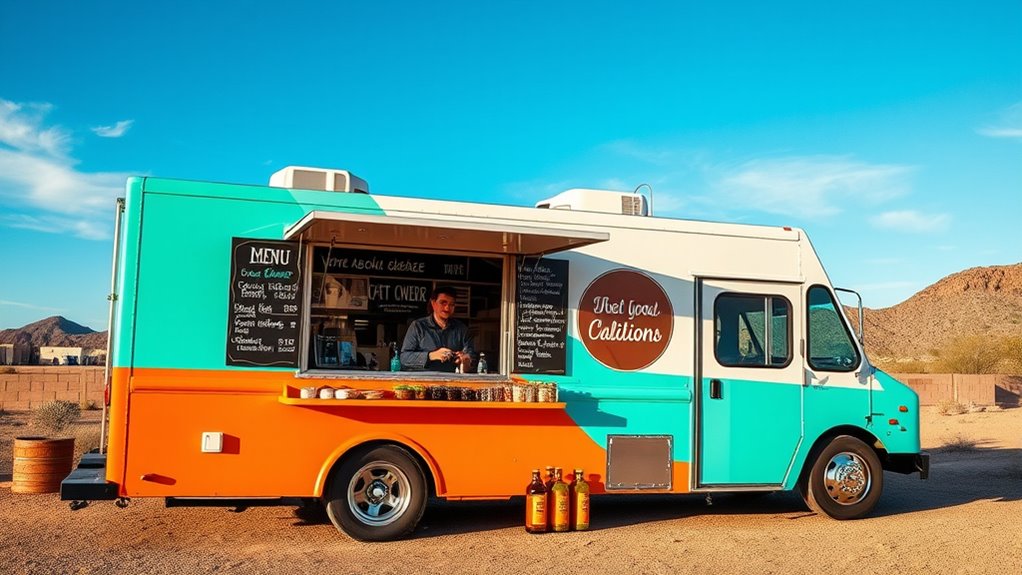
Choosing the right ingredients and understanding their costs are key to designing a profitable menu. You’ll want to explore sourcing options that balance quality and price to keep your expenses in check. Calculating ingredient costs accurately helps you set prices that cover your costs and attract customers. Additionally, being aware of the costs associated with ingredient procurement can help you negotiate better deals with suppliers and optimize your budget.
Ingredient Sourcing Strategies
To create a menu that appeals to your target customers and maintains profitability, you’ll need to carefully select quality ingredients and set competitive prices. Sourcing local not only supports the community but also guarantees fresher, higher-quality ingredients. Prioritize ingredient quality to stand out and build a loyal customer base. Consider these key strategies:
- Build relationships with local farmers and suppliers to access fresh, seasonal produce.
- Focus on sourcing ingredients that align with your menu concept, emphasizing quality over cost.
- Regularly evaluate your suppliers to maintain high standards and adapt to seasonal availability.
Ingredient Cost Calculation Methods
Understanding how to accurately calculate ingredient costs is essential for designing a profitable menu and setting competitive prices. To do this, you need reliable ingredient pricing and thorough cost analysis. Start by recording the cost of each ingredient used in your recipes, including bulk purchases and leftovers. Break down the recipe into portions to determine the cost per serving. Use this data to calculate your food cost percentage, ensuring your prices cover ingredient costs and other expenses. Regularly review ingredient prices to adjust your pricing strategy as needed. Implementing precise cost analysis helps you identify high-cost items and optimize your menu for profitability. Accurate ingredient cost calculation is a crucial step in creating a sustainable food truck business in Phoenix.
Technology and Operations

Implementing contactless payment options makes transactions faster and safer for your customers. Using real-time stock tracking software helps you stay on top of inventory and reduces waste. Embracing these technologies can streamline your operations and improve the overall customer experience. Additionally, understanding cookie management can enhance your website’s privacy and user experience.
Contactless Payment Options
Adopting contactless payment options can streamline your food truck operations and improve customer experience. By leveraging digital transaction solutions, you make transactions faster, safer, and more convenient. Here are three key benefits:
- Faster Service: Contactless payments reduce wait times, keeping lines moving smoothly.
- Enhanced Security: Digital transaction solutions minimize cash handling risks and protect customer data.
- Increased Sales: Offering multiple contactless options appeals to more customers, encouraging higher spending.
Integrating contactless payments into your setup ensures a seamless experience for customers and simplifies daily operations. Whether through mobile wallets or tap-and-go cards, these options keep your food truck competitive in Phoenix’s bustling food scene, helping you grow your business efficiently.
Real-Time Stock Tracking Software
How can real-time stock tracking software transform your food truck’s daily operations? By improving inventory management, it ensures you always know what’s in stock, reducing waste and preventing shortages. This technology streamlines supply chain logistics, allowing you to quickly reorder ingredients before they run out. With real-time updates, you can monitor stock levels on the go, making adjustments based on demand and sales trends. This minimizes delays and keeps your menu consistent. Accurate inventory data also helps you forecast needs more precisely, saving money and optimizing stock turnover. Overall, real-time stock tracking software keeps your food truck running smoothly, minimizes errors, and boosts efficiency — enabling you to focus on delivering great food and excellent customer service.
Marketing and Growing Your Presence

To grow your food truck’s presence in Phoenix, you need to actively promote your location and specials through a popular event calendar. Implementing loyalty programs and offering regular deals can keep customers coming back. These strategies will help you build a loyal following and boost your visibility in the local food scene. Monitoring customer feedback and adjusting your offerings accordingly can further enhance your reputation. Additionally, highlighting special promotions and ensuring consistent quality will encourage repeat visits and positive word-of-mouth.
Popular Food Truck Event Calendar
Staying organized with a well-planned food truck event calendar is essential for building your presence in Phoenix. Participating in popular food truck festivals and culinary competitions boosts visibility and attracts new customers. To maximize your impact, consider these key strategies:
- Schedule your appearances around major food truck festivals to reach larger crowds and network with other vendors.
- Enter culinary competitions to showcase your unique offerings and earn recognition in the local food scene.
- Maintain consistency by attending recurring events, helping you build a loyal customer base over time.
Loyalty Programs and Specials
Building a loyal customer base in Phoenix goes beyond just participating in events; implementing effective loyalty programs and specials can keep customers coming back. You can boost customer loyalty by offering rewards for repeat visits, such as punch cards or mobile app points. Promotional specials like discounts during slow hours or birthday treats encourage frequent visits and word-of-mouth. Use the table below to plan your strategies:
| Loyalty Program | Promotional Specials | Customer Engagement |
|---|---|---|
| Punch Card System | Happy Hour Discounts | Social Media Campaigns |
| Mobile App Rewards | Combo Meal Deals | Customer Feedback Incentives |
| Referral Rewards | Seasonal Promotions | Loyalty Tiers |
These approaches foster connection, increase sales, and build a dedicated community around your Phoenix food truck.
Master Local Event Opportunities
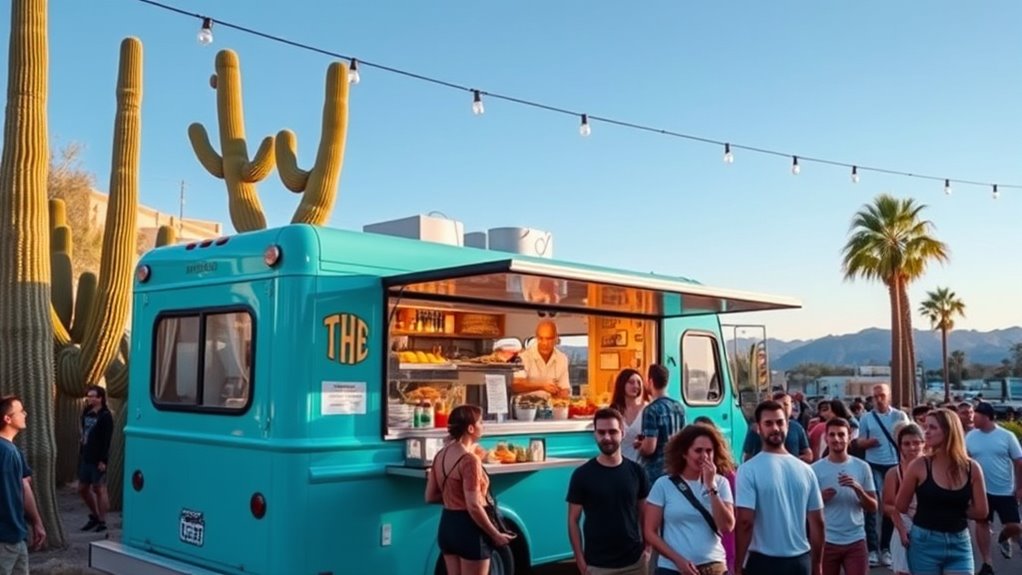
Exploring local events is one of the most effective ways to boost your food truck’s visibility in Phoenix. By participating, you can strengthen your food truck branding and reach new customers. To maximize your impact, consider these key opportunities:
- Attend community festivals and farmers’ markets to connect directly with locals.
- Partner with local organizations for charity events or themed festivals, gaining exposure.
- Use social media marketing to promote your presence at these events and engage your audience beforehand.
Mastering these opportunities helps you build a loyal customer base and enhances your reputation. Each event is a chance to showcase your unique offerings, gather feedback, and refine your brand presence. Get involved, be consistent, and watch your food truck thrive.
Frequently Asked Questions
What Permits Are Required for Mobile Food Vending in Phoenix?
You need to obtain a mobile food vendor permit from the Phoenix Health Department and a City of Phoenix Business License. Additionally, verify your food truck meets health and safety standards, including proper food truck branding and sanitation. You’ll also need to set up mobile payment systems for customer convenience. These permits and systems help you operate legally and attract customers, making your food truck a success in Phoenix.
How Do I Find the Best Locations for My Food Truck?
To find the best locations for your food truck, you should analyze parking strategies and customer demographics. Look for high-traffic areas with ample parking and foot traffic, like busy downtown spots, parks, or near events. Research your target customers’ preferences and routines, then test different locations during peak times. Stay flexible, observe customer flow, and adapt your spots based on sales data to maximize visibility and sales.
What Are Common Health and Safety Regulations in Phoenix?
You need to follow Phoenix’s health and safety regulations to keep your food truck compliant. This includes maintaining proper food safety practices, such as correct storage, handling, and sanitation. You’ll also require regular health inspections to ensure your truck meets local standards. Stay updated on regulations from the Arizona Department of Health Services and make sure your staff understands best practices for food safety to avoid violations and keep customers safe.
How Can I Differentiate My Food Truck From Competitors?
To stand out, focus on fostering fresh, fun, and flavorful food. You can differentiate your food truck by creating unique branding that resonates with your target audience, making your truck memorable. Innovate your menu with inventive ingredients or international influences, offering something different daily. Combining eye-catching visuals, engaging experiences, and exceptional eats will help you carve out your niche and captivate customers amid the crowded culinary scene.
What Seasonal Considerations Should I Plan for in Phoenix?
You should plan for seasonal menu changes to match Phoenix’s weather challenges, like offering lighter, invigorating dishes in summer and heartier options in winter. Be prepared for hot temperatures by ensuring your equipment can handle the heat and keep food crisp. Adjust your hours during extreme heat or monsoon season to avoid weather disruptions. Staying flexible with your menu and operations helps you thrive year-round in Phoenix’s climate.
Conclusion
Starting your food truck in Phoenix is an exciting venture, but it takes more than just a good idea. By understanding local rules, planning your budget, and crafting a standout menu, you set yourself up for success. Don’t forget to leverage events and build your presence in the community. Remember, if you play your cards right, you’ll be cooking with gas in no time—just stay flexible and keep your eyes on the prize.
